- Home
- E. M. Foner
Carnival On Union Station (EarthCent Ambassador Book 5) Page 7
Carnival On Union Station (EarthCent Ambassador Book 5) Read online
Page 7
“You all know that a segment of our population broke away a long time ago to become, well, freebooters outside of Stryx space,” Ortha said. The tunnel network Hortens were notoriously sensitive about the fact that their estranged cousins were overrepresented in the piracy demographic, but of course, they were notoriously sensitive about everything. “It seems that Gem outposts and mining colonies are increasingly left unprotected, and surprisingly, some of the Gem whose facilities get raided are begging to join with their attackers.”
“When the fabric of a centralized society begins to weaken, it frays first around the edges,” Czeros commented. “We have no particular insight into the Gem Empire as the very concept of cloning is abhorrent to us, but just before this meeting, I heard report of a Gem military vessel trying to surrender itself to one of our frigates out there, somewhere,” he concluded with a vague gesture at the ceiling.
“Was their surrender accepted?” Kelly asked urgently, suddenly fearing the worst.
“We are not at war,” Czeros answered. “I’m told that our captain, against the wishes of his crew I may add, transferred emergency supplies to the Gem vessel. But he wisely avoided committing the Frunge to a course of action by doing anything official.”
“So we can agree that their empire is under some stress,” Bork said. “Our own intelligence has detected an uptick in official Gem selling activity in various markets. Unfortunately for the Gem, they have little that anybody wants. A culture dedicated to the cloning and support of a single individual tends to lose touch with the galactic trends.”
The door to the conference room slid open, and the ambassadors were startled to see two Gem in uniforms.
“Please remain in your seats,” the older Gem said as she entered the room. For a moment, Kelly wondered if they were being taken hostage by some splinter group. Then the woman placed a napkin in front of the Grenouthian ambassador, and they all realized that the Gem were working for a human caterer.
“Serendipitous,” Bork muttered to Kelly. “Do you think we should take advantage and ask a few questions?”
“Don’t forget the language barrier,” Kelly whispered back. “Their employer must use a translation box, unless these two have been working long enough to learn some English.”
“Try saying something to them,” Bork suggested.
Kelly hesitated, then addressed the clone who was placing a large oval tray of citrus fruit on the table. The peeled fruit had all been separated into sections and arranged in flower patterns of pink, orange, yellow and green.
“Excuse me,” Kelly said to the woman, who had stepped back from the table to view the results of her work. “Do you speak English?”
The clone cleared her throat and said, “Gratuities accepted.”
Bork grumbled and dug in his pocket, extracting a twenty-cred piece which he deposited in the clone’s outstretched palm. “I’m the host. That’s for everybody.”
The Gem didn’t understand Drazen, but she smiled and said “Thank you.” Twenty creds would buy a lot of chocolate if you got up early enough on delivery day. She and her sister pushed the empty bus floater back into the corridor and headed for their next job.
Kelly didn’t want to be the first to ruin the artistic arrangement of citrus wedges, but her fellow ambassadors had no such compunctions. The discussion was put on hold for a moment as they all began to inhale the fruit. The Dollnick was particularly effective, grabbing pieces with all four hands and throwing them towards his mouth in a continual arc. Czeros concentrated on the sole cheese platter.
“These are excellent,” Bork informed Kelly. “Best oranges I’ve ever had.”
Kelly tried one of the wedges pointed out by the Drazen ambassador and her face immediately puckered up. “This is a lemon,” she sputtered.
“It really is delicious,” Apria concurred with the Drazen. “I find it quite droll that when you humans finally produce a really tasty fruit, you can’t eat it.”
“If there are no objections, I will speak while you feed,” the Verlock ambassador slowly intoned from the end of the table. He couldn’t compete for fruit with the fast-twitch muscles of the grabby diplomats, and didn’t care for high water content foods in any case.
“Mmph, please,” Bork yielded the floor.
“Gem is both an individual and a species. A centrally planned empire with a rigid system for raising and educating young clones has exacerbated isolation from the larger galactic economy. A combination of vanity and paranoia has led the Gem to believe that their system is superior to all others, that progress is equivalent to treason, and that everyone else stands against them.”
“That much is true,” Czeros interrupted.
“Verlock analysts are in agreement that the Gem Empire is on a course to self-destruction. But the current wave of defections was not predicted by our modeling of the situation, which included as a fundamental assumption that the Gem are too similarly programmed, through both genetics and upbringing, to revolt against themselves.”
“Nature versus nurture,” Kelly commented.
“Nature and nurture,” Czeros corrected her.
“Clones are hardly natural,” Apria pointed out.
“The point being, we were wrong,” the Verlock continued as if no interruptions had taken place. “It is unclear to us why we were wrong. Gem is neither evolving nor changing through selective breeding. While Gem technology is largely frozen in time at the level of their last civil war, their mastery of the cloning process is undoubtedly sufficient to prevent large-scale replication errors that could explain the statistical anomalies in individual behavior.”
“Wait a second,” Kelly said, holding up her hand to stop the Verlock. “I don’t know anything about replication technology, but both my dinner with the Gem ambassador a few years ago and my recent meeting with the Free Gem were enough to convince me that they are individuals, even though they are clones.”
“Did that make sense in your native language, or are you interviewing for a job as an oracle?” Apria asked icily. “According to my translation implant, you just said that the clones are clones even though they are clones.”
“What’s the word for ‘clone’ in your native language?” Kelly asked.
“Gem,” the Vergallian ambassador replied. Most of the diplomats around the table shook their heads in agreement.
“But our Verlock colleague and myself are differentiating between Gem as a species and cloning as a replication process,” Kelly pointed out.
“With all due respect to our esteemed Verlock friend, he speaks so slowly that by the time he finishes a sentence, I forget how it started,” Crute replied. “Besides, what difference does it make? We’re all agreed that cloning is a nasty business, though I have to admit, they make a fantastic fruit platter.”
“My point is that most of you have a preconceived notion that the forty billion or so Gem are indivisible as one, while I’ve come to see them as a dysfunctional family.”
“The human ambassador is correct,” Apria said, beaming a smile that made Kelly feel a chill down to her toes. “Due to her unique understanding of the Gem situation, I move that we appoint Mrs. McAllister the permanent chair of this committee rather than rotating duties. She can handle any necessary communications between the Gem, Free Gem, Stryx and whatnot. I know that my own time would be better spent preparing an acceptance speech for my inevitable election as Carnival Queen.”
“Agreed,” chorused several of the other ambassadors, hastily rising from their seats.
Kelly glared at Czeros, who was trying to slip out unnoticed behind the large Dollnick ambassador.
“I have a, uh, thing, with, uh, you know,” he apologized, then turned and fled.
“What did I do wrong, Bork?” Kelly complained. “One minute, the ambassadors were sharing intelligence information, the next minute, they dumped the whole thing on me and ran for the door.”
“Slide me the cracker platter,” Bork replied sadly, pointing at the former c
heese platter that had been denuded of cheese. “If I had ordered more food they would still be here.”
“So now I’m supposed to make all the decisions on my own responsibility, without the support of the other species?”
“They were just getting even with you for suggesting that they didn’t understand the Gem, a race we’ve all been in contact with for longer than humans have practiced agriculture,” Bork explained. “As chairman, or chairwoman, you can still call a meeting at any time.”
“It’s getting to the point that I’m afraid to open my mouth in meetings,” Kelly grumbled. “You know, our EarthCent committee made me Minister of Intelligence just for being at the wrong place at the wrong time.”
Eight
“So you’re all sneaking off together for some kind of male bonding trip?” Blythe asked skeptically.
“There are only two human colony worlds outside the tunnel network and both of them are completely independent of Earth,” Clive explained. “We don’t know anything about their defensive readiness, and if the Gem situation worsens and the clone military goes berserk, those colonies could be attractive targets.”
“Kibbutz and Bits,” Blythe continued dismissively. “Together they sound like one of those weird product names that marketers used to come up with back on Earth.”
“We assume that Kibbutz is a collective world established along socialist guidelines that prohibit personal property,” Clive said. “Bits is a planet of technology geeks, a place where people plug in, turn on and tune in to virtual reality. Neither world has an EarthCent presence and we really don’t know much about them. Just another area where our intelligence is falling short.”
“Bits produces a lot of interactive games, they’re one of the big brand names. I’ve also heard they do a lot of contract programming for mechanicals and other dumb devices,” Paul chimed in.
“I understand why Clive has to go, he’s the head of EarthCent Intelligence and the captain of the Effterii,” Aisha interrupted. “And Woojin is your new defense expert, I get that. But why do you have to go?” she demanded of her husband.
“I’m sort of the envoy to the geeks,” he replied self-consciously. “And the ambassador wanted me to go for some reason.” Wrapping himself in the non-existent EarthCent flag usually worked with Aisha.
“His mother wanted him to go so that Jeeves would go too,” Blythe interpreted for Aisha. “I’ll bet she’s afraid that Jeeves will ignore the older Stryx and fix the election in her favor if he’s here on the station. He’d probably do it at the last minute, just for a joke.”
“And why is Thomas going?” Aisha asked.
“We’ve got two ex-mercenaries, a former Nova champion and an unstable Stryx off on a jaunt across the galaxy in a sentient alien spaceship,” Blythe explained. “I thought it would be a good idea for Thomas to go along to supervise. He was our best babysitter before he caught the secret agent bug.”
“Well, that’s all settled then,” Clive declared, putting an arm around Blythe’s shoulders. The two couples were meeting for lunch at the latest ice cream parlor to open in the Little Apple, a retro restaurant that featured high-backed booths that were ideal for snuggling. How they earned enough selling ice cream to pay for the inefficient use of floor space was anybody’s guess.
“I still think you’re trying to sneak off to get out of having to judge any more contestants,” Aisha accused her husband.
“That’s not true!” Paul protested energetically. “I enjoyed meeting all of those artists, and they did some really interesting work.”
“But you were supposed to at least narrow down the list of candidates. The rest of us took a lot of criticism for making some hard choices when we started picking finalists from our groups. You just kicked the can down the road for another week, and now you aren’t going to be here to pick it up!”
“That’s another reason for me to go,” Paul pointed out. “I’m not any good at judging that subjective stuff. If it was just a question of picking which painting was the reddest, which drawing looked like a real bowl of fruit, which sculpture would be worth the most as scrap metal, I’m your man. But everybody expected me to see things that just weren’t there, and when I didn’t, they tried to talk me into it. You can’t explain art, at least not to me. And if the work can’t speak for itself, what’s the point?”
“You’re just lucky that Shaina and Brinda agreed to help out,” Aisha told him. In addition to leaving Jeeves at loose ends, the end of the auction season meant that Peter Hadad’s workaholic daughters were back on the station, and they had happily stepped into the role of special troubleshooters for the human Carnival committee. Since Aisha and the three remaining committee members all had full-time jobs, they had willingly handed over the organizational work, though they were still stuck judging the weekend trials.
“So where is the rest of your merry band?” Blythe asked her husband. The men were leaving the station after lunch, and she wasn’t in any hurry to see her husband off, so she was nursing her coffee milkshake. Her initial impulse had been to invite herself along on the improvised mission, but Lynx was now filling in as Union Station’s cultural attaché in addition to her recruit-training duties. It wouldn’t have been fair to run off with Clive and Thomas, who were numbers one and four in the organization, leaving Lynx as the only senior member of EarthCent Intelligence in charge during what could easily turn into their first crisis.
“Woojin is helping Joe get the Nova ready for our trip,” Paul explained. “The tug will fit in the Effterii’s hold, and we can use it as a shuttle to get down to the colony worlds. Jeeves said something about visiting the Stryx storerooms, and Thomas asked me to ping him ten minutes before we leave, just in case he loses track of time.”
“Did you get all of that, Aisha?” Blythe asked.
“I think so,” the young diplomat replied cautiously. “Woojin and Joe are doing maintenance, Jeeves is getting supplies, and Thomas is meditating or something.”
“Woojin and Joe are loading the Nova with beer, Jeeves is loading himself with weapons, and Thomas is in a club on some deck where the species call it night, dancing with Chance,” Blythe corrected her. “Am I right, Paul?”
“You make it sound like we’re all trying to get away with something,” he mumbled.
Two hours later, as the main bay doors of the Effterii slid shut behind the Nova and the two pilots unstrapped their safety harnesses, Paul turned to Clive and exclaimed, “I can’t believe we got away with it. I thought I was going to be stuck another weekend trying to referee a bunch of crazy artists.”
“Try auctioning the stuff off sometime,” Jeeves commented. “The bidders don’t even look at the works, they’re just buying the name. You could pick a used napkin out of the trash, sign it ‘Jonathan Posturnack,’ put it in a frame, and I’ll auction it off for a million creds.”
“Posturnack,” Woojin said, joining in from one of the two fold-out jump seats behind the command chairs. “I think I recognize that name. Is he the one who rounded up a bunch of starving feral cats in Paris, poured different colors of paint on them, and used hidden cameras to shoot an immersive when he released them in a fancy restaurant?”
“Yes, the height of human artistic endeavor,” Jeeves remarked.
“Oh, I saw that too,” Paul said. “It was kind of funny.”
“It sounds like the kind of activity I was always instructed not to let the children engage in when I was babysitting for humans,” Thomas commented, freeing himself from the safety harness on the other jump seat. “No playing with food or paint was at the very top of the list.”
“Did we just jump?” Woojin suddenly asked in surprise.
“Yup, we’re approaching Kibbutz orbit now, stealth mode,” Clive replied with a grin. “I’ve been practicing with the Key, and the Effterii is pretty tuned in to my thought patterns now. I can transmit simple instructions without even moving my lips.”
“When you said the Effterii jumps were practically i
nstantaneous, I was thinking along the lines of minutes or hours instead of days or weeks.” Woojin said. “That felt different, like something between a jump and a tunnel transit. I’ve been through hundreds of both, and that was more muted than a jump, but with more wrongness than a tunnel.”
“Wrongness?” Thomas inquired. “I don’t believe I’ve ever heard tunnel transits described that way.”
“I know exactly what he means,” Paul said. “A minute ago, I could have pointed you in the direction of Union Station, even though we’re inside the Nova in Zero-G in the hold of the Effterii. I might have pointed the wrong way, but I would have felt like I knew where it was. Now I feel like I’d have to look down just to see where my feet are.”
“You know why we stretch out tunnel transits for biologicals,” Jeeves reminded his friend. “Your brains don’t adapt well to traveling light years in an instant. The Effterii method is closer to Stryx tunnel technology than to the crude jump tricks employed by biologicals. This ship moves around the galaxy by hopping through the multiverse, rather than punching holes.”
“This’ll teach me to go on a trip without asking about the engines,” Woojin remarked dryly. “Are you saying that rather than going from point A to point B using a bunch of math I don’t understand, this ship has gone from point A in one universe to point B in another universe using a bunch of math I don’t understand?”
“That’s one interpretation,” Jeeves replied cheerfully. “The equations allow for an infinite number of universes branching from every new event, but even if we’ve swapped universes rather than returning to our own, I don’t see the problem if we can’t tell the difference.”
“That’s because you’re not married,” Paul groaned. “Please, whether this is our own universe or not, when we get back to Union Station, nobody mention the part about how we may not be us to Aisha.”
“Don’t forget that the sudden change is likely interfering with your mental processes and leading you to think morbid thoughts,” Jeeves added helpfully. “Now, do you want me to initiate contact with the humans on the surface, or shall we wait until the Nova exits the hold and becomes visible to their planetary defense systems?”

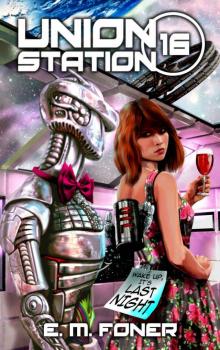 Last Night on Union Station (EarthCent Ambassador Book 16)
Last Night on Union Station (EarthCent Ambassador Book 16)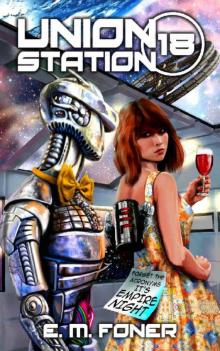 Empire Night on Union Station (EarthCent Ambassador Book 18)
Empire Night on Union Station (EarthCent Ambassador Book 18)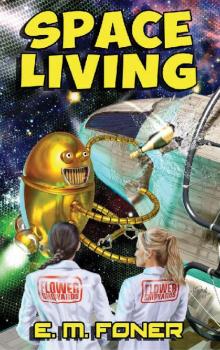 Space Living (EarthCent Universe Book 4)
Space Living (EarthCent Universe Book 4)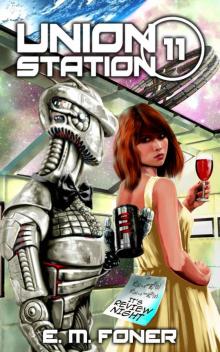 Review Night on Union Station (EarthCent Ambassador Book 11)
Review Night on Union Station (EarthCent Ambassador Book 11)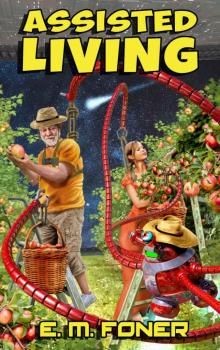 Assisted Living
Assisted Living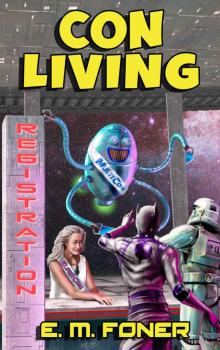 Con Living
Con Living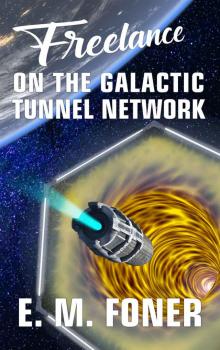 Freelance On The Galactic Tunnel Network
Freelance On The Galactic Tunnel Network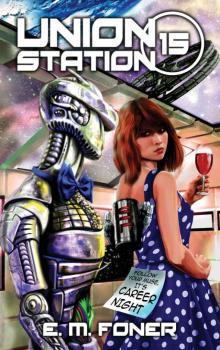 Career Night on Union Station
Career Night on Union Station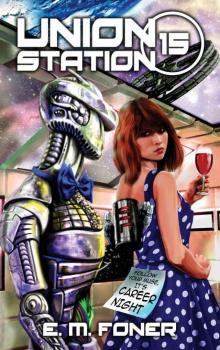 Career Night on Union Station (EarthCent Ambassador Book 15)
Career Night on Union Station (EarthCent Ambassador Book 15)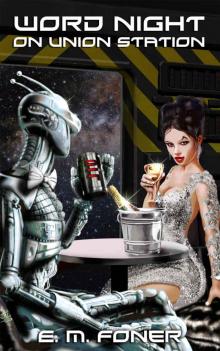 Word Night on Union Station (EarthCent Ambassador Book 9)
Word Night on Union Station (EarthCent Ambassador Book 9)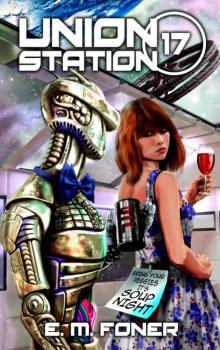 Soup Night on Union Station
Soup Night on Union Station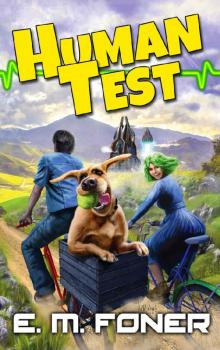 Human Test
Human Test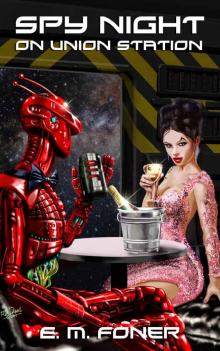 Spy Night on Union Station (EarthCent Ambassador Book 4)
Spy Night on Union Station (EarthCent Ambassador Book 4)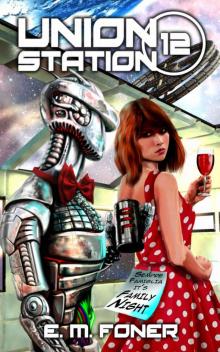 Family Night on Union Station (EarthCent Ambassador Book 12)
Family Night on Union Station (EarthCent Ambassador Book 12)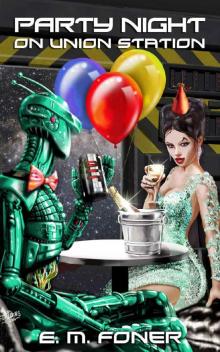 Party Night on Union Station (EarthCent Ambassador Book 10)
Party Night on Union Station (EarthCent Ambassador Book 10)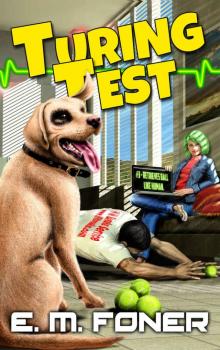 Turing Test
Turing Test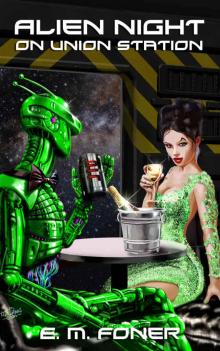 Alien Night on Union Station (EarthCent Ambassador Book 2)
Alien Night on Union Station (EarthCent Ambassador Book 2)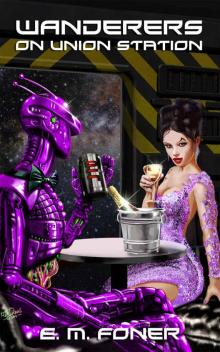 Wanderers On Union Station (EarthCent Ambassador Book 6)
Wanderers On Union Station (EarthCent Ambassador Book 6)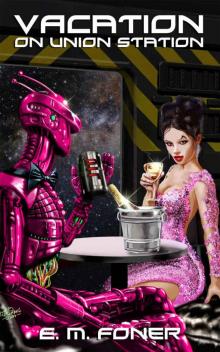 Vacation on Union Station (EarthCent Ambassador Book 7)
Vacation on Union Station (EarthCent Ambassador Book 7)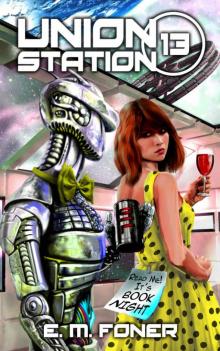 Book Night on Union Station (EarthCent Ambassasor 13)
Book Night on Union Station (EarthCent Ambassasor 13)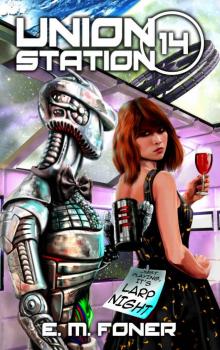 LARP Night on Union Station
LARP Night on Union Station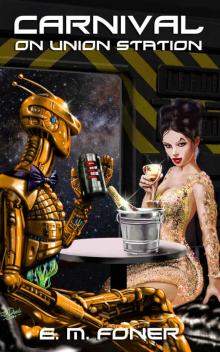 Carnival On Union Station (EarthCent Ambassador Book 5)
Carnival On Union Station (EarthCent Ambassador Book 5)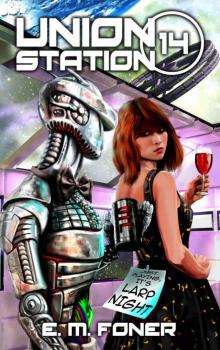 LARP Night on Union Station (EarthCent Ambassador Book 14)
LARP Night on Union Station (EarthCent Ambassador Book 14)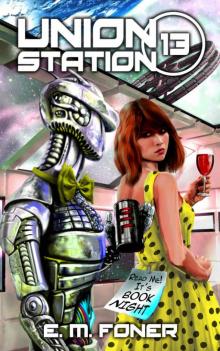 Book Night on Union Station
Book Night on Union Station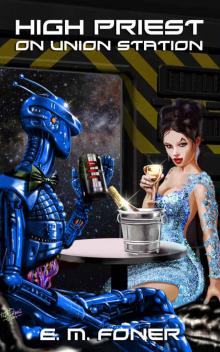 High Priest on Union Station (EarthCent Ambassador Book 3)
High Priest on Union Station (EarthCent Ambassador Book 3)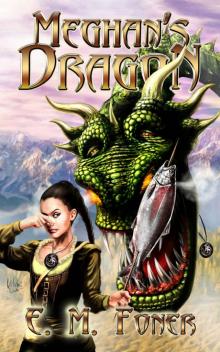 Meghan's Dragon
Meghan's Dragon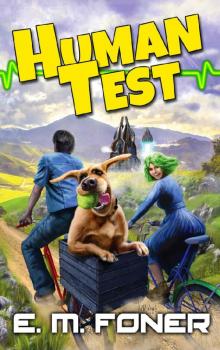 Human Test (AI Diaries Book 2)
Human Test (AI Diaries Book 2)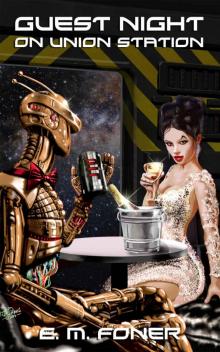 Guest Night on Union Station
Guest Night on Union Station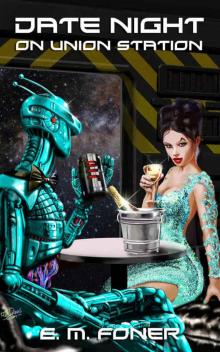 Date Night on Union Station
Date Night on Union Station